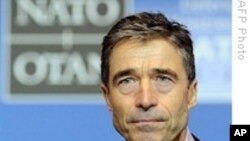NATO defense ministers Friday endorsed the kind of broad counterinsurgency approach for Afghanistan that is the basis for the pending troop request by the NATO and the U.S. commander there, General Stanley McChrystal. The ministers, including U.S. Defense Secretary Robert Gates, are meeting in Bratislava, Slovakia.
NATO Secretary General Anders Fogh Rasmussen says the defense ministers have a "general shared view" that the alliance must make Afghanistan strong enough to defend itself against militant forces. And he said the ministers also agree on the approach for accomplishing that.
"There is the support of this counterinsurgency strategy, which means that ministers agree that it does not solve the problems in Afghanistan just to hunt down and kill individual terrorists," Rasmussein said. "What we need is a much broader strategy which stabilizes the whole Afghan society."
That has been the core of the debate in Washington, with President Barack Obama reviewing the counterinsurgency strategy for Afghanistan he announced in March. The review was prompted, in part, by a grim assessment from General McChrystal, who is here at the NATO meeting to provide a direct readout to the defense ministers. The general's secret assessment, leaked to the Washington Post (newspaper) several weeks ago, follows the president's basic approach, but says it could fail unless he gets more troops.
His specific request is still secret, but it is believed to involve tens of thousands more troops.
Speaking to reporters Friday, Secretary Gates would not be drawn publicly into the debate over whether the troop-intensive counterinsurgency strategy is best or whether a more limited commitment involving air strikes and Special Forces operations would be better. He called any conclusions on that issue "vastly premature," and said key presidential decisions are two or three weeks away.
But the secretary stressed that the United States has "no intention" of withdrawing from Afghanistan, and said even a U.S. troop reduction is "very unlikely."
"The question is do we have the strategy right in light of the situation we face? Does it need refinement in some way?" Gates noted. "And if it does need some adjustment in light of the events that have taken place over the last number of months, including the election and so on, and then what are the implications of that in terms of General McChrystal's resource request?"
The secretary said the United States will not abandon its core mission in Afghanistan, which President Obama described as the destruction of the al-Qaida terrorist network, because it is "critical" to U.S. national security. And he said he received indications other NATO nations may be thinking about sending additional forces to help.
Also on Friday, Secretary General Rasmussen said the NATO defense ministers agreed to begin a process of identifying criteria for an eventual handover of security responsibility to Afghan forces.
"Let me be clear, we have not agreed to start handing over the lead," Rasmussen said. "The conditions are not yet right. The Afghan security forces are not yet strong enough. And I must also stress that transition, when it happens, doesn't mean NATO forces leave. It means they go into a supporting role."
The secretary general would not say when the transition might start, how long it will take, or when it might be possible to start reducing the NATO troop commitment.
Rasmussen and Gates also reported that the NATO defense ministers endorsed the Obama Administration's approach to European missile defense. The president is abandoning a Bush Administration plan to put anti-missile installations in Poland and the Czech Republic. He is replacing it with a plan that would provide a combined land- and sea-based capability more quickly, focused on shorter range missiles Iran could use to threaten Europe, with the option of expanding later to cover longer range missiles if necessary.
News
NATO Ministers Endorse McChrystal Approach in Afghanistan
update

<!-- IMAGE -->



